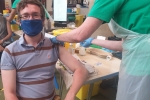This section has been designed to provide information, guidance and advice with regards to Coronavirus (COVID-19).
All government advice on COVID-19 can be found here.
If you need medical help, please use the 111 online coronavirus service.
Information about coronavirus - COVID-19
Coronaviruses are a ‘type’ of virus. The novel coronavirus we are all hearing about is called COVID-19, but you may also hear it called coronavirus.
How serious is COVID-19?
The evidence shows us that the vast majority of people who get this virus have relatively mild symptoms and make a full recovery. But in a small percentage of cases, the virus can cause more severe symptoms. This is particularly true for people with a weakened immune system, for older people over the age of 70 and for those with long term conditions like diabetes, cancer and chronic lung disease.
A lot of false information about this virus is being shared - it’s very important that you make sure that the information you use comes from a trusted source - all of the information on this page has been sourced from the NHS.
Why should we be social distancing or self isolating?
The more people who become infected, the more pressures our NHS will be under. If too many vulnerable residents are infected at any given time then NHS resources will be stretched and eventually unable to cope.
We have seen in other countries, such as Spain and Italy, that this virus can overwhelm modern healthcare systems.
So you should stay at home, protect our NHS and save lives.
On March 23rd the Prime Minister, Boris Johnson, set out rules governing when and how you can leave your home for a very limited set of purposes.
It is so important that we all follow these rules to ease the pressure on our health service:
- People are warned not to meet friends or family members who they do not live with
- Shopping is only permitted for essentials like food and medicine, and people are advised to do it “as little as you can”
- Police have powers to enforce the rules, including through fines and dispersing gatherings
- All shops selling non-essential goods, such as clothing and electronic stores, are ordered to close
- Libraries, playgrounds, outdoor gyms and places of worship are to close
- All gatherings of more than two people in public - excluding people you live with - are banned
- All social events, including weddings and baptisms are banned
- Funerals are not included in the new restrictions
- Parks will remain open for exercise but gatherings will be dispersed
- Restrictions “under constant review” and will be checked again in three weeks. They will be relaxed “if the evidence shows we are able to.”
What are the symptoms?
If you are infected you may have very minor symptoms, minor symptoms or more severe symptoms, but the NHS cites two symptoms to look out for as:
- A new continuous cough
- A fever or high temperature
What should I do if I have either of the above symptoms?
- Protect others - don't call NHS 111
- Protect others - don't call, or go to your GP
- Protect others - don't go to your local hospital
Isolate yourself immediately
However if:
- You are, or become, unable to manage with your symptoms at home
- Your conditions get worse
- Your symptoms do not get better after 7 days
You should use the online 111 service or if you can't use the online service call 111.
Information for Individuals and Businesses
I have received many queries about the impact of Coronavirus on individuals and businesses. On the menu on the left, I have tried to provide a comprehensive guide to the support available.
For businesses and employers, please check Government guidance here and here.
For employees, please check Government guidance here.
For those who are self-employed please check Government guidance here.





